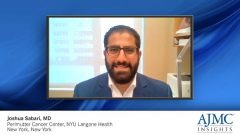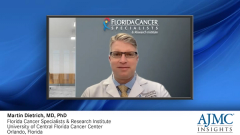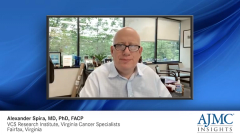
Educating Payers and Providers on Advanced NSCLC With Mutations
Three medical professionals recommend educational needs for both payers and providers within the NSCLC treatment landscape.
Episodes in this series

Alexander Spira, MD, PhD, FACP: The education that we need to provide is really for providers more than anybody else. I haven't had many issues with payers in terms tests. It's great you have all these targets, but you can't treat them with a targetable therapy if you don't test for the target. It sounds simple, but there's a lot of data published through US Oncology Research, which I'm part of. The MYLUNG study showed that, as of a couple of years ago, we are still only doing about 70%–75% of testing [for EGFR in patient with non-small cell lung cancer], and those drugs have been around forever. We need to test early and test often. All patients in the United States have access to this testing. There are other countries [where it is] more challenging for cost reasons. Everybody in the United States currently has access to testing; it's just a matter of the timing. I'm a community-based oncologist, and it's been harder for the community to uptake [testing] because it's more fragmented. There are multiple hospitals, multiple oncology labs, multiple provider groups vs an academic center where it's one-size-fits-all—you go to one system, and it's all there. 90% of patients get phenomenal care and are treated outside academic medical centers, but we need to keep moving the dial further.
Joshua Sabari, MD: For payers, it's important to understand that this is a complicated and complex disease. Broad panel NGS [next generation sequencing] is a must and needs to be reimbursed because if not, we can't identify the alteration to match the patient to the best possible therapy. When you look at precision medicine, it's come under a lot of fire. Are we really improving survival for our patients and quality of life? In the EGFR space, we're talking about survival in the 38-, 39-month range compared with what we've seen with standard chemotherapy, which is about a year and a half. We've added value to our patients. Payers need to understand how important matching patients to the correct targeted therapy is. When you look at small differences between individual agents, that's when it becomes more difficult of a discussion. If you have a drug that has a 5% improvement in response and a negligible 1 month-or-so improvement in progression-free survival, does that calculate into a better therapy? That's more of a debate in economic circles. For me and my patients, I use the best medication that has the best activity efficacy, as well as the best safety profile because we want to enhance patient quality of life. We know that stage 4 advanced non-small cell lung cancer is treatable, but it's not curable, right? The goal of all systemic therapies is to decrease symptoms—to treat symptoms related to the cancer, but also extend life, with a focus on quality of life.
Martin Dietrich, MD, PhD: The education we need—this is affecting the oncology community, from the clinical aspect to the patient, to payers and other stakeholders in the space—is [providing] the best possible outcomes for patients with the least amount of adverse effect burden [at the most reasonable cost]. The key to accomplishing this is evidence-based medicine with a precision medicine approach. [Planning] out the individual steps for patients upfront is important, and that's by the investment upfront in a next generation sequencing panel. This is oftentimes done by both liquid- and tissue biopsy-based assessments synchronously. We optimize outcomes for patients, see the sequence of events happening, and everybody must understand that this is not an optional step for the identification. When we look at KRAS, there is an understanding of what KRAS biology signifies, with both on label and clinical trial options. There are 4 treatment opportunities. Those are interesting for additional therapies, both in the first line and later line settings, while we use it more in the single agent setting currently. There's nobody here uninterested in understanding the presence of these molecular mutations and exploiting them for patients' benefit.
This transcript has been edited for clarity.
Newsletter
Stay ahead of policy, cost, and value—subscribe to AJMC for expert insights at the intersection of clinical care and health economics.











